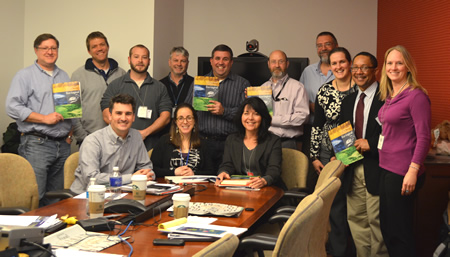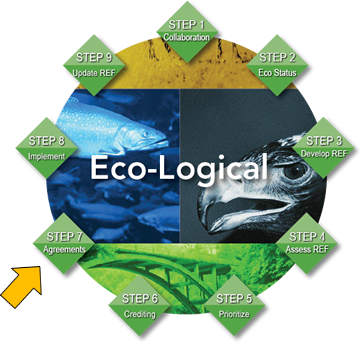Eco-Logical Peer Exchange: Mitigation Approaches for State DOTs;
March 11-12, 2015
Activity Report

The Federal Highway Administration (FHWA) and the American Association of State Highway and Transportation Officials (AASHTO) are jointly leading an effort to develop tools and resources for State Departments of Transportation (DOTs) and other agencies that are interested in Implementing Eco-Logical into their programs. This activity report summarizes the discussions held at the Mitigation Peer Exchange with DOTs, held in Washington, D.C, on March 11 and 12, 2015 at FHWA Headquarters.
Peer Exchange
AASHTO and FHWA hosted a peer exchange on programmatic mitigation with State DOTs at FHWA Headquarters office in Washington, D.C., on March 11th and 12th. The participants were from California DOT, South Carolina DOT, Colorado DOT, and Florida DOT. Guest speakers included Lauren Diaz from the U.S. Army Corps of Engineers (USACE) and Deborah Mead from the U.S. Fish and Wildlife Service (USFWS). DOT participants discussed their State programmatic mitigation needs and exchanged dialogue with other participants to help advance their programs.
The discussion at the mitigation peer exchange focused on Step 7 of the Eco-Logical Approach. Each participant explained the current status and goals of their mitigation program. Subject matter experts from USACE and USFWS explained mitigation approach options and provided information to answer participant questions.

Peer Exchange Agenda
- Peer exchange objectives
- Background discussion on each DOT's mitigation programs, successes, and challenges
- Process to establish a migration bank
- Funding a mitigation program
- Date and tools to manage mitigation sites
- Implementation and permitting with resource and regulatory agencies
- Next steps
Participants
Helpful Reference Materials
Topics of Discussion
General mitigation discussion
- What is your region’s history with mitigation programs?
- What have been (or do you anticipate to be) the greatest barriers to a successful mitigation program in your State?
Process to establish a mitigation bank
- Do you have any programmatic mitigation banks?
- Why are you interested in establishing a mitigation bank?
- Does anyone have experience with moving from a project-based approach to something more programmatic?
Species banking
- What types of data or plans are helpful to establish species banks?
- What types of agreements have you used to establish species banks?
Funding a mitigation program
- What funding mechanisms have worked for your State?
- What authorities or regulatory constraints govern funding for a mitigation program?
- Do other State agencies have different constraints or opportunities?
- Do you have local partners that could help with funding?
Data and tools for site identification
- Describe your State's GIS capacity and staff.
- Describe the type of resource data available in your State.
- What data and plans has your State used to identify mitigation sites? What would you recommend to other States?
- For those that are using data tools as part of their mitigation programs, how often do you use these tools? How do they affect your daily work?
Implementing and permitting with resource and regulatory agencies
- If you have an existing mitigation program, how are State and Federal resource and regulatory agencies involved in this program?
- What new relationships will you need to form to have a successful mitigation program?
Next Steps
The next steps for each of the attending DOTs are to bring back the information they learned from the peer exchange and apply it to their program. And, contact information was shared so each attendee can follow-up with their new DOT partner from the peer exchange!
Need to request technical assistance for your Eco-Logical program? Please submit a request.

